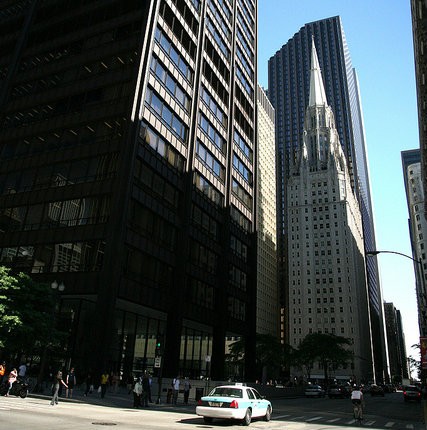The morning communion rush

Since the New Year, I've been stopping at the Chicago Temple
on Wednesday mornings for communion. For at least 40 years, this downtown
United Methodist church has offered communion to city dwellers and commuters
during the morning rush. At 7:30, Phil Blackwell--who inherited the
tradition--consecrates the elements with whomever happens to be in the room at
the moment. For the next 90 minutes, communion and a simple prayer are offered
for anyone who walks in.
The communion, offered without a traditional liturgy, could
very well have an "express lane" feel. When I first heard about this communal
rite, I wondered: theologically, what is communion absent community?
Culturally, why do I and others imagine we don't have time for liturgy?
Ecclesiastically, what is communion that is all take (on my part) and no give?
But Blackwell and associate pastors Claude King and Wendy
Witt all say the early-morning communion is a personal highlight of their
ministries. Sixty thousand people walk by the corner of Washington and La Salle
every day, says Blackwell, and even if 59,500 knew about the communion, they
wouldn't be interested. But for those few who come in out of the cold, the
heat, the wind and the hubbub of the city, the sense of sanctuary is palpable.
"It really isn't 'express lane' communion," Blackwell says,
because people actually slow down when they come into the space. They shed
their jackets and bags; they breathe deeply.
When John Wesley sent missionaries to America, he said
simply, "Offer them Christ." That's what the Chicago Temple sees itself doing,
no questions asked. On a recent morning--on my way between the train and work, caught
in a throng of commuters with heads down and coats buttoned against the wind--I
stopped in.
I sat briefly in a pew of the deeply quiet sanctuary while
Blackwell finished administering communion and praying with a group of kneeling
communicants. When I went forward and received, I was joined by four others on
the kneeler. Blackwell prayed for us together as a group while laying hands on each
of us separately, and then we went on our way.
Blackwell says they keep offering early-morning communion
because, quite simply, "it works." And I think I know what he means. I was
fleetingly but tangibly connected to the whole body of Christ. I was newly
oriented toward my day's activities. A wayfaring stranger, I was warmly
greeted, welcomed and served.
Oddly enough, instead of being stultifyingly
individualistic, early-morning communion had the effect of emphasizing the common in communion. I felt that I
was, for the first time that day, sharing the common concerns, joys, burdens
and worries of people who drop in from whatever path they are taking.
If that's the express lane, then I will be back in it, with
gratitude, as often as I can.






